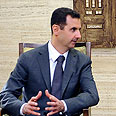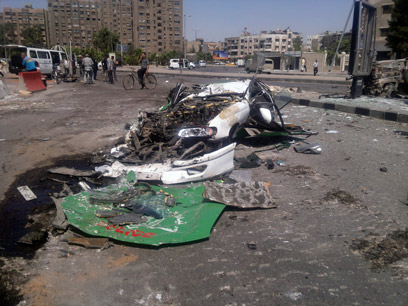
White House: Assad still controls chemical weapons
US says actively consulting Syria's neighbors over security of chemical weapons, believes stockpile under government control after defector claims Assad's forces moving weapons ahead of offensive
The United States is closely monitoring Syria's chemical weapons stockpile and is "actively consulting" Damascus's neighbors to stress concerns over the security of those weapons and Syria's responsibility to safeguard them, the White House said on Saturday.
"We believe Syria's chemical weapons stockpile remains under Syrian government control," White House spokesman Tommy Vietor said. "Given the escalation of violence in Syria and the regime's increasing attacks on their people, we remain very concerned about these weapons."
Related stories:
- Syrians report heavy fighting in Aleppo
- Barak: Israel may seize weapons in Syria
- 'US plans for Syrian regime's collapse'
That was the White House response to a question about a Syrian military defector's claim that President Bashar Assad's forces were moving chemical weapons across the country for possible use against the opposition in a military retaliation for the killing of four top security officials.
"The regime has started moving its chemical stockpile and redistributing it to prepare for its use," said General Mustafa Sheikh, citing rebel intelligence obtained in recent days.
"They are moving it from warehouses to new locations," he told Reuters in an interview in southern Turkey, close to the Syrian border. "They want to burn the country. The regime cannot fall without perpetrating a sea of blood."
Syria's 16-month conflict has been transformed since Wednesday, when a bomb killed four members of Assad's narrow circle of kin and lieutenants, including his powerful brother-in-law, defense minister and intelligence chief.
Sheikh's comments could not be independently verified and Syria has denied any such move.

Crushed car in Damascus (Photo: AP)
Western and Israeli officials, concerned that chemical stockpiles could fall into the hands of militants, said a week ago that Syria appeared to be shifting weapons from storage sites, but it was not clear whether the operation was a security precaution or a preparation for deployment.
On Friday Israel said it would consider military action if needed to ensure Syrian missiles or chemical weapons did not reach Assad's allies in Lebanon, the Shiite group Hezbollah.
Sheikh, who fled his post in the northern command of Assad's army in January, said the coming days would see increased shelling of Sunni strongholds in Damascus and Aleppo.

Rebels in Hama (Photo: Reuters)
But unleashing a broader and bloodier army assault would fuel an intense backlash by the mostly Sunni rebels, he said.
"The coming phase will witness a phase of bloodshed that is unprecedented and the regime will resort to non-conventional weapons. Every action will trigger a bigger reaction," he said.
"Assad wants to burn the country. This dictatorial and sectarian regime will not fall without a sea of blood," said Sheikh, whose military council provides a political umbrella to the armed resistance to Assad's rule.
Rebel gains
Since Wednesday's attack, rebels have pushed into the heart of the capital and seized control of other towns. On Thursday, they captured three border crossings with Iraq and Turkey, the first time they have held sway over Syria's frontiers.
Sheikh said the success of Wednesday's bombing, which Free Syrian Army rebels claimed to have carried out, was the fruit of experience gained from months of conflict, rather than any fresh weapons supply.
"The weapons that are coming from outside are a drop in the ocean and are too trivial to make a difference," he said.

Bound rebels near Damascus (Photo: AFP)
The success of Wednesday's attack surprised him, even though he was tipped by rebels over a month ago they were undertaking a top secret operation targeting Assad's inner circle.
"When I heard of it, I stood in awe that we had reached such a stage inside," he said.
"I was aware of it, but of course did not plan it, the rebels told me that there would be a qualitative operation that would go after the head of the regime in these days ... closer to the holy month of Ramadan," said Sheikh.

Bombing in Homs (Photo: AP)
The perpetrator of the attack was "someone who worked with a top official ... the Free Syrian Army is present in every corner of the state", he said, declining to give any further details.
Sheikh said momentum gained by the rebels was prompting faster high-level defections and at least 100,000 soldiers have deserted out of the 320,000-strong military, almost double the numbers of only a few months ago. On Saturday a Turkish official told Reuters two Syrian brigadier-generals had fled to Turkey overnight.
Opposition sources have said thousands more Sunni soldiers have been confined to their barracks, but cannot desert because of the grip of military intelligence and lack of safe areas.
The involvement of the best trained elite forces from the Fourth Brigade to the Republican Army in the widening offensive showed the extent of attrition within the army, he said.
"Every day there is attrition ... the collapse of the regime is now accelerating like a snowball," Sheikh said.
- Receive Ynetnews updates directly to your desktop










